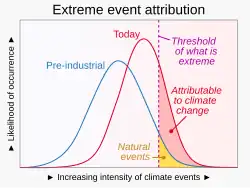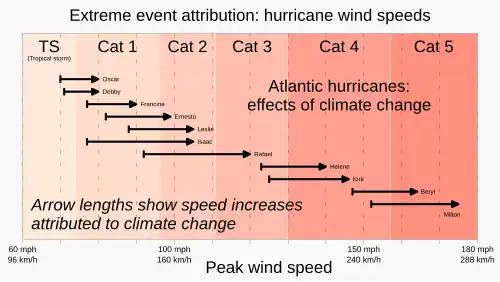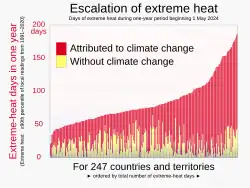Extreme event attribution

Extreme event attribution, also known as attribution science, identifies and quantifies the role that human-caused climate change plays in the frequency and intensity of extreme weather events.[2][3] Attribution science aims to determine the degree to which such events can be explained by or linked to human-caused global warming and are not simply due to natural variability.[4]
History
The concept of fraction attributable risk (FAR)[5] was first applied in a 2004 analysis[6] of the 2003 European heatwave, providing a direct link between anthropogenic climate change and an individual extreme climate event.[1][p. 4] Attribution science was described in a 2011 State of the Climate publication by the American Meteorological Society which concluded that human-caused climate change had a role in five of six extreme weather events studied.[7] Advances in research, and increasing computing power, has enabled extreme event attribution to become a growing branch of climate science.[4] The greater computing power of the 2000s allowed weather to be simulated over and over again, and conceptual breakthroughs in the early to mid 2010s allowed attribution science to come into existence.[8] The American Meteorological Society stated in 2016 that "the science has now advanced to the point that we can detect the effects of climate change on some events with high confidence".[9]
Purpose
Climate Central explained that "attribution studies calculate whether, and by how much, climate change affected the intensity, frequency or impact of extremes" such as wildfires, droughts, rainfall, and typhoons.[12] German climatologist Friederike Otto said that attribution science aims to answer the question, "did climate change play a role" in specific extreme events "within the news time frame – so within two weeks of the event".[8] Results of attribution studies allow scientists and journalists to make statements such as, "this weather event was made at least n times more likely by human-caused climate change" or "this heatwave was made m degrees hotter than it would have been in a world without global warming" or "this event was effectively impossible without climate change".[13]
An extended function of attribution science is to go beyond attributing extreme events to global warming, and to also assess the impact of those events on human vulnerabilities and society's ability to adapt.[8] Attribution science gives people a more concrete description of what climate change means to their environment, provides scientific evidence to the public discourse, and enables targeted adaptation based on expected increases in specific types of extreme events.[8]
Methods
German climatologist Friederike Otto explained that attribution scientists use climate models to simulate what is possible under current climate conditions, and compute the likelihood of this particular event occurring given the forces affecting today's climate.[8] Then, the pre-global warming world is simulated by removing anthropogenic warming forces from the climate models or by performing statistical modeling on observations of the late 19th and early 20th century.[8] Finally, differences in intensity or in frequency between the two simulations are deemed to be caused by climate change.[8] Otto emphasized that scientists use methods that have already been peer reviewed, allowing studies of new events to be published within a "news cycle" time frame.[8]
Along similar lines, atmospheric scientist Xubin Zeng said that attribution studies generally proceed in four steps: (1) measuring the magnitude and frequency of a given event based on observed data, (2) running computer models to compare with and verify observation data, (3) running the same models on a baseline "Earth" with no climate change, and (4) using statistics to analyze the differences between the second and third steps, thereby measuring the direct effect of climate change on the studied event.[4]
Understanding the relevant drivers and their model representation—such as atmospheric dynamics, atmospheric and soil moisture, and surface cover—is essential to improve heatwave prediction and projection.[14] Zeng said that heat waves are more accurately modeled than other extreme events because long-term temperature data is more reliable than other events' datasets.[4] Rainfall is also relatively straightforward, but droughts, snowstorms, tropical storms and wildfires are more complicated.[13]
Findings
Climate Central's November 2024 review of more than 600 climate attribution studies covered almost 750 extreme weather events and trends.[12] The review found that climate change made 74% of events more likely or severe, and that about 9% were made less likely or severe.[12]
Climate change was found to affect the intensity and frequency of extreme weather events differently; for example, the 2010 Russia heat wave was made far more likely but not more intense.[4]
Applications and influence
Attribution science has affected climate change litigation by being cited in lawsuits against companies for causing, and governments for not addressing, climate change.[13][15][16]
Examples
The Sabin Center for Climate Change Law, Columbia University, maintains searchable databases with categories: climate change attribution, extreme event attribution, impact attribution, source attribution, and attribution in the courts.[19]
Carbon Brief contains an interactive map including more than 600 studies covering almost 750 extreme weather events and trends.[12]
Examples include:
- Hurricane Sandy (October 2012): flooded an area 27 square miles (70 km2) larger[3]
- Louisiana floods (August 2016): 40% more likely[3]
- US winter heat wave (February 2017): three times more likely[3]
- Hurricane Harvey (August 2017): three times more likely and 15% more intense[3]
- Australian bushfires (2019-2020): at least 30% more likely, and heat extremes more likely by at least a factor of 2[20]
- Atlantic hurricane season (2020): for hurricane-strength storms: increased 3-hourly storm rainfall rates for by 11%, and 3-day accumulated rainfall amounts by 8%[21]
- Western North America heat wave (June-July 2021): 150 times more likely[22]
- Worldwide review of likelihood and intensity of heat extremes (2022): tens of thousands of deaths directly attributable[23]
- Review of rainfall events in North Atlantic basin (2022): events, combined, caused $500 billion in damages[23]
See also
References
- 1 2 Stott, P.A., Christidis, N., Otto, F.E.L., Sun, Y., Vanderlinden, J.-P., van Oldenborgh, G.J., Vautard, R., von Storch, H., Walton, P., Yiou, P. and Zwiers, F.W. "Attribution of extreme weather and climate-related events". WIRES Climate Change. 7: 23–41. January 2016. doi:10.1002/wcc.380. Figure 1.
- ↑ NASEM (2016). Attribution of Extreme Weather Events in the Context of Climate Change. Washington, D.C.: The National Academies Press. ISBN 978-0-309-38094-2. Retrieved 3 September 2021.
- 1 2 3 4 5 "The Science Connecting Extreme Weather to Climate Change" (PDF). Union of Concerned Scientists. 4 June 2018. Archived (PDF) from the original on 10 June 2025.
- 1 2 3 4 5 Zeng, Zubin (25 August 2021). "Is climate change to blame for extreme weather events? Attribution science says yes, for some – here's how it works". The Conversation. Archived from the original on 9 June 2025.
- ↑ Allen, Myles (27 February 2003). "Liability for climate change". Nature. 421: 891–892. doi:10.1038/421891a.
- ↑ Stott, Peter A.; Stone, D. A.; Allen, M. R. (2 December 2004). "Human contribution to the European heatwave of 2003". Nature. 432: 610–614. doi:10.1038/nature03089.
- ↑ Hu, Jane (19 December 2019). "The Decade of Attribution Science". Slate. Archived from the original on 6 March 2025.
- 1 2 3 4 5 6 7 8 Sneed, Annie (2 January 2017). "Yes, Some Extreme Weather Can Be Blamed on Climate Change". Scientific American. Archived from the original on 3 January 2017.
- ↑ Herring, Stephanie C.; Hoell, Andrew; Hoerling, Martin P.; Kossin, James P.; Schreck III, Carl J.; Stott, Peter A. (1 December 2016). "Bulletin of the American Meteorological Society / Introduction to Explaining Extreme Events of 2015 from a Climate Perspective". American Meteorological Society. Archived from the original on 28 June 2025.
- 1 2 Lindsey, Rebecca (15 December 2016). "Extreme event attribution: the climate versus weather blame game". Climate.gov. National Oceanic and Atmospheric Administration (NOAA). Archived from the original on 9 June 2024.
Graphic adapted from Figure 4.7 in NAS 2016.
- ↑ "Climate change made the deadly heatwaves that hit millions of highly vulnerable people across Asia more frequent and extreme". World Weather Attribution. 14 May 2024. Archived from the original on 19 June 2025.
- 1 2 3 4 McSweeney, Robert; Tandon, Ayesha (18 November 2024). "Mapped: How climate change affects extreme weather around the world". Climate Central. Archived from the original on 10 June 2025.
- 1 2 3 Clarke, Ben; Otto, Friederike (2021). "Reporting extreme weather and climate change A guide for journalists" (PDF). World Weather Attribution. Archived (PDF) from the original on 1 June 2025.
- ↑ Domeisen, D. I. V., Eltahir, E. A. B., Fischer, E. M., Knutti, R., Perkins-Kirkpatrick, S. E., Schär, C., Seneviratne, S. I., Weisheimer, A., & Wernli, H. (2023). Prediction and projection of heatwaves. Nature Reviews. Earth & Environment, 4(1), 36–50. https://doi.org/10.1038/s43017-022-00371-z
- ↑ Harvey, Chelsea (2 January 2018). "Scientists Can Now Blame Individual Natural Disasters on Climate Change". Scientific American. Archived from the original on 2 January 2018.
- ↑ Schiermeier, Quirin (2021-09-08). "Climate science is supporting lawsuits that could help save the world". Nature. 597 (7875): 169–171. Bibcode:2021Natur.597..169S. doi:10.1038/d41586-021-02424-7. PMID 34497398. S2CID 237452741.
- ↑ ● Gilford, Daniel M.; Giguere, Joseph; Pershing, Andrew J. (20 November 2024). "Human-caused ocean warming has intensified recent hurricanes". Environmental Research: Climate. 3 (4). doi:10.1088/2752-5295/ad8d02.
● Explained in "Climate change increased wind speeds for every 2024 Atlantic hurricane: Analysis" (PDF). Climate Central. 20 November 2024. Archived (PDF) from the original on 20 November 2024. - ↑ Giguere, Otto; Tanenenbaum, Vahlbert (30 May 2025). "Climate Change and the Escalation of Global Extreme Heat: Assessing and Addressing the Risks" (PDF). Climate Central, Red Cross Red Crescent Climate Centre, and World Weather Attribution. Archived (PDF) from the original on 31 May 2025. Click on "Download the data", and in spreadsheet choose "Countries and territories" tab at bottom to view raw data.
- ↑ "Climate Attribution Database". Sabin Center for Climate Change Law, Columbia University. 2020. Archived from the original on 16 May 2025.
- ↑ Oldenborgh, Geert Jan van; Krikken, Folmer; Lewis, Sophie; Leach, Nicholas J.; Lehner, Flavio; Saunders, Kate R.; Weele, Michiel van; Haustein, Karsten; Li, Sihan; Wallom, David; Sparrow, Sarah; Arrighi, Julie; Singh, Roop P.; Aalst, Maarten K. van; Philip, Sjoukje Y.; Vautard, Robert; Otto, Friederike E. L. (11 March 2020). "Attribution of the Australian bushfire risk to anthropogenic climate change". Natural Hazards and Earth System Sciences Discussions: 1–46. doi:10.5194/nhess-2020-69. hdl:20.500.11850/475524.
- ↑ Reed, Kevin A.; Wehner, Michael F.; Zarzycki, Colin M. (12 April 2022). "Attribution of 2020 hurricane season extreme rainfall to human-induced climate change". Nature Communications. 13 (1905): 1905. Bibcode:2022NatCo..13.1905R. doi:10.1038/s41467-022-29379-1. PMC 9005694. PMID 35414063.
- ↑ Philip, S. Y., Kew, S. F., van Oldenborgh, G. J., Anslow, F. S., Seneviratne, S. I., Vautard, R., Coumou, D., Ebi, K. L., Arrighi, J., Singh, R., van Aalst, M., Pereira Marghidan, C., Wehner, M., Yang, W., Li, S., Schumacher, D. L., Hauser, M., Bonnet, R., Luu, L. N., Lehner, F., Gillett, N., Tradowsky, J. S., Vecchi, G. A., Rodell, C., Stull, R. B., Howard, R., and Otto, F. E. L. "Rapid attribution analysis of the extraordinary heat wave on the Pacific coast of the US and Canada in June 2021". Earth System Dynamics. 13 (4). Copernicus Publication: 1689–1713. 8 December 2022. doi:10.5194/esd-13-1689-2022, 2022.
{{cite journal}}: Check|doi=value (help) - 1 2 Clarke, Ben; Otto, Friederike; Stuart-Smith, Rupert; Harrington, Luke (28 June 2022). "Extreme weather impacts of climate change: an attribution perspective". Environmental Research: Climate. 1 (1): 012001. doi:10.1088/2752-5295/ac6e7d. hdl:10044/1/97290. S2CID 250134589.
External links
- "Climate Attribution".
- "World Weather Attribution".
- Clarke, Ben; Otto, Friederike (2021). "Reporting extreme weather and climate change A guide for journalists" (PDF). World Weather Attribution. Archived (PDF) from the original on 1 June 2025. — A guide intended to help journalists navigate the question, ""Was this event caused by climate change?"



